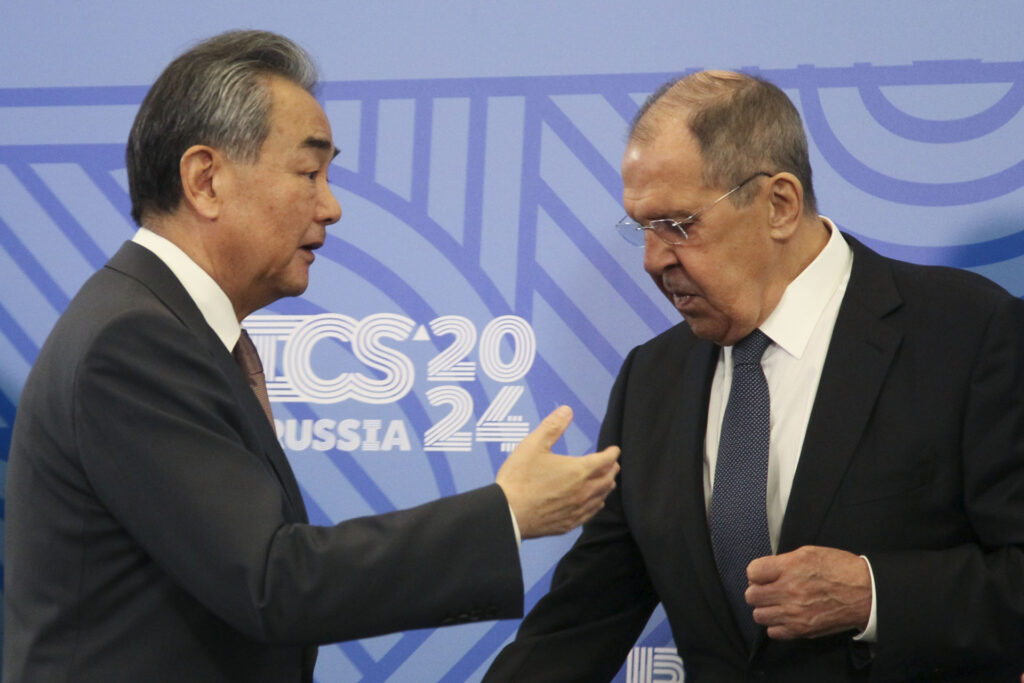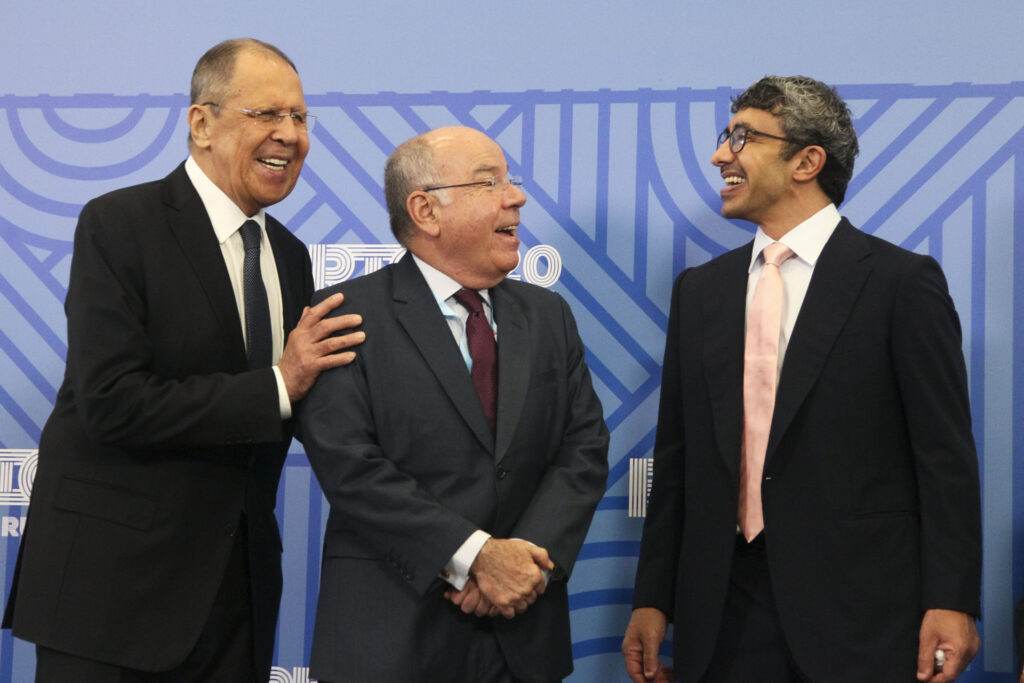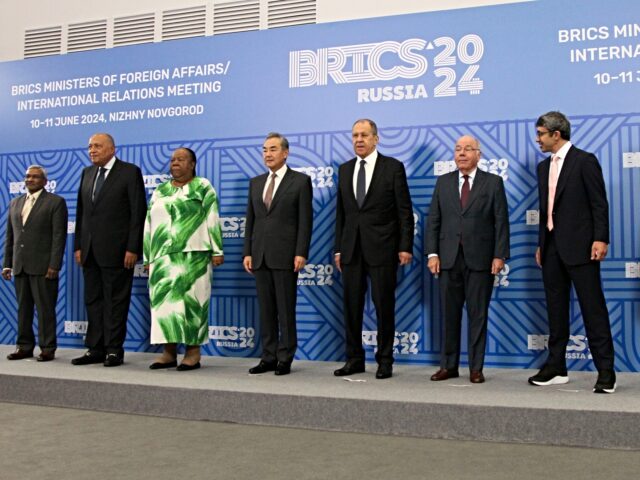The BRICS coalition representing several rogue states including China, Russia, and Iran issued a statement following its foreign minister meeting on Monday condemning Israel for attempting to defend itself from the Iran-backed terrorist organization Hamas, specifically its operations in Rafah, Gaza.
Hamas, which is one of several jihadist groups believed to receive $100 million a year in funding from BRICS member Iran, invaded Israel from its Gaza stronghold on October 7, killing an estimated 1,200 people and abducting about 250 people, of which about 128 remain in captivity today. The October 7 siege featured outrageous acts of torture, gang rape, infanticide, and other atrocities, committed by terrorists swarming residential communities and targeting entire families in their homes.
The BRICS countries did not mention Hamas in their statement condemning Israel.
BRICS foreign ministers met on Monday and Tuesday in Nizhny Novgorod, Russia, in preparation for the annual summit of its heads of government, scheduled to take place in October this year. The summit brought together the top diplomats of the original BRICS members – Brazil, Russia, India, China, and South Africa – alongside representatives of its newest member countries: Egypt, Iran, the United Arab Emirates (UAE), and Ethiopia. Saudi Arabia also received an invitation to join BRICS but, as of February, has not formalized its membership.
The foreign minister meeting was also open to representatives of countries interested in joining the group, including rogue states such as Cuba and Venezuela, but also critical regional powers such as Turkey.

Chinese Foreign Minister Wang Yi, left, gestures while speaking to Russian Foreign Minister Sergey Lavrov as they prepare to pose for a photo on the sidelines of the meeting of BRICS foreign ministers in Nizhny Novgorod, Russia, Monday, June 10, 2024. (AP Photo/Roman Yarovitsin)
The condemnation of Israel was part of a much broader joint statement by all the foreign ministers present at Monday’s meeting that prominently featured several core BRICS demands, including the erosion of the U.S. dollar’s influence in the global economy and the reform of the United Nations Security Council to give permanent seats to more member states. It expressed a general sentiment of global cooperation against terrorism that did not, apparently, extend to defeating Hamas.
“The Ministers expressed grave concern at the deterioration of the situation in the Occupied Palestinian Territory [sic],” the statement read, “in particular the unprecedented escalation of violence in the Gaza Strip as a result of the Israeli military operation that led to mass civilian displacement, death and casualties, and destruction of civilian infrastructure.”
“They expressed grave concern by the increasing attacks by Israel on Rafah, which would compound the dire humanitarian situation,” the ministers continued. “The Ministers further condemned the Israeli military operation in Rafah and its ramifications that directly impact the civilian lives.”
The statement accused Israel of “continued blatant disregard of international law” for operating in Rafah, the southernmost city in Gaza, and called for a “two-state solution based on international law” that would see the creation of a state of “Palestine” alongside Israel.
“They equally called for the immediate and unconditional release of all hostages and civilians who are being illegally held captive,” the joint statement read.
RELATED: “I am Hamas!” Pro-Palestinian Protester Screams Outside of White House
Israel began a self-defense operation in Gaza after declaring war on Hamas on October 8, entering northern Gaza and working its way down eliminating terror command centers, weapons caches, and liberating hostages. The Israel Defense Forces (IDF) have found, among other targets, widespread tunnel networks in Rafah connecting Hamas to Egypt and allowing them to freely stockpile weapons and other critical supplies. The tunnels and terror hubs have, in many cases, been found in civilian locations such as schools, hospitals, and even a child’s bedroom.
The BRICS ministers did not name Hamas in its text condemning Israel or address October 7. The text did take a moment to “strongly condemn” the March 22 terrorist attack at the Crocus City Hall in Moscow, but did not similarly address October 7 despite its extensive provision on the war in Gaza and the statement’s championing of a “BRICS Counter-Terrorism Working Group” to contain terrorist threats around the world.
China, the world’s second-largest economy and second most populous country, is widely believed to be the most influential nation in BRICS. Despite currently engaging in a genocide against Muslim people in occupied East Turkistan, the Chinese Communist Party has been vocally sympathetic to Iran, its proxy group Hamas, and the jihadist cause generally. China defended Iran’s attempted bombing of Israel in April – in which it shot over 300 drones, cruise missiles, and ballistic missiles at Israel unsuccessfully – as “restrained” and urged Israel not to respond.
Most BRICS members maintain virulently anti-Israel foreign policies. Russia and China have both opposed Israel’s self-defense rights at the Security Council, while South Africa is currently embroiled in a case accusing Israel of “genocide” for attacking Hamas at the International Court of Justice (ICJ).
Brazilian President Luiz Inácio Lula da Silva was declared persona non grata in Israel after comparing the anti-Hamas operations to the Holocaust in February (Lula claimed Israeli officials were lying about his on-the-record statements). Iran’s Islamist regime supports the complete destruction of Israel, while Egypt maintains a begrudging peace with Israel but has opposed anti-Hamas operations.

Russian Foreign Minister Sergey Lavrov, left, Brazilian Foreign Minister Mauro Vieira, center, and Foreign Minister of United Arab Emirates Sheikh Abdullah bin Zayed Al Nahyan smile ahead of posing for a photo on the sidelines of the meeting of BRICS foreign ministers in Nizhny Novgorod, Russia, Monday, June 10, 2024. (AP Photo/Roman Yarovitsin)
The UAE, Ethiopia, and India are the most Israel-friendly governments in BRICS. The UAE was part of the historic Abraham Accords under President Donald Trump, establishing relations with Israel and being one of the few Mideast countries to condemn the atrocities of October 7. Ethiopia, with a sizable diaspora in Israel, has seen its government largely abstain from any high-profile remarks on the current conflict.
India has been the most vocal supporter of Israel in BRICS. Following the October 7 atrocities, Prime Minister Narendra Modi published a statement declaring that his people “stand firmly with Israel in this difficult hour.” A spokesman for his Bharatiya Janata Party (BJP), RP Singh, told reporters that Hamas was “worse than ISIS” and dismissed concerns about Hamas supporters killed in the conflict: “They started it so we can’t say people from both sides have been killed.”
“Regarding UNSC permanent membership, our aim is to get it as soon as possible. But, this target won’t be achieved that soon. Because the permanent members, still enjoy much clout,” he said, according to Asian News International (ANI). “Whether it’s the Ukraine or Gaza, they make dealings among themselves on issues that affect the whole world. So, they won’t want that it (number of permanent members) becomes six, seven or eight.”
New Delhi has opposed sanctions on Russia over the Ukraine invasion and increased its purchases of Russian oil since 2022. India has, however, condemned Russia after reports surfaced that anti-Ukrainian forces were scamming Indian nationals into fighting for Russia in the country.

COMMENTS
Please let us know if you're having issues with commenting.